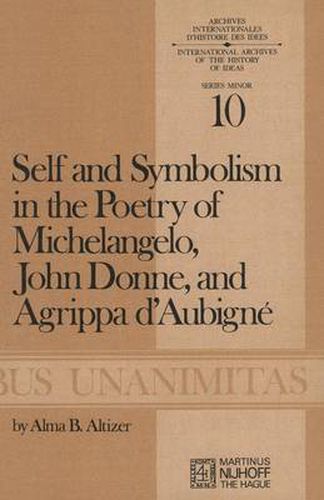Readings Newsletter
Become a Readings Member to make your shopping experience even easier.
Sign in or sign up for free!
You’re not far away from qualifying for FREE standard shipping within Australia
You’ve qualified for FREE standard shipping within Australia
The cart is loading…






This title is printed to order. This book may have been self-published. If so, we cannot guarantee the quality of the content. In the main most books will have gone through the editing process however some may not. We therefore suggest that you be aware of this before ordering this book. If in doubt check either the author or publisher’s details as we are unable to accept any returns unless they are faulty. Please contact us if you have any questions.
Alienation, ecstasy, death, rebirth: in the poetry of Michelangelo, Donne, and d’ Aubigne these archetypal themes make possible the ultimate formulation of new poetic symbolizations of self and world. As their poetry evolves from a primarily rhetorical towards a fully symbolic mode, images of loss of self (in ecstasy or in alienation), of death and rebirth, recur with increasing frequency and intensity. Whether the context is love poetry or religious poetry, the basic problem remains the same; love is the link between the two kinds of poetry. And love is indeed a problem for these three poets, since it involves the self in relation to the other, the other being either God or another human being. Increasingly, the work of each poet centers on a need to analyze or abolish the gulf separating subject and object, self and other. The dominant mode of most of the three poets’ work is neither rhetorical nor symbolic, but expressive. This transitional mode reveals the individual poet’s most urgent concerns and conflicts, his sense of self in Its most isolated or burdensome, affirmative or struggling state. Under lying most of their poems is a profound self-consciousness - a heightened awareness of self as a powerful, separate entity, with a corresponding objectification of all reality outside of self. The Renaissance in general is a time of increasing individualism and 1 self-consciousness.
$9.00 standard shipping within Australia
FREE standard shipping within Australia for orders over $100.00
Express & International shipping calculated at checkout
This title is printed to order. This book may have been self-published. If so, we cannot guarantee the quality of the content. In the main most books will have gone through the editing process however some may not. We therefore suggest that you be aware of this before ordering this book. If in doubt check either the author or publisher’s details as we are unable to accept any returns unless they are faulty. Please contact us if you have any questions.
Alienation, ecstasy, death, rebirth: in the poetry of Michelangelo, Donne, and d’ Aubigne these archetypal themes make possible the ultimate formulation of new poetic symbolizations of self and world. As their poetry evolves from a primarily rhetorical towards a fully symbolic mode, images of loss of self (in ecstasy or in alienation), of death and rebirth, recur with increasing frequency and intensity. Whether the context is love poetry or religious poetry, the basic problem remains the same; love is the link between the two kinds of poetry. And love is indeed a problem for these three poets, since it involves the self in relation to the other, the other being either God or another human being. Increasingly, the work of each poet centers on a need to analyze or abolish the gulf separating subject and object, self and other. The dominant mode of most of the three poets’ work is neither rhetorical nor symbolic, but expressive. This transitional mode reveals the individual poet’s most urgent concerns and conflicts, his sense of self in Its most isolated or burdensome, affirmative or struggling state. Under lying most of their poems is a profound self-consciousness - a heightened awareness of self as a powerful, separate entity, with a corresponding objectification of all reality outside of self. The Renaissance in general is a time of increasing individualism and 1 self-consciousness.